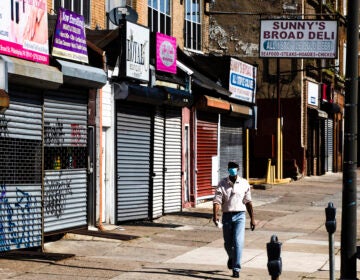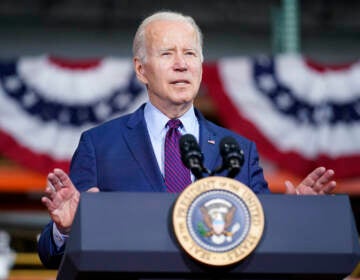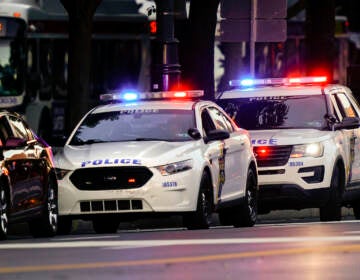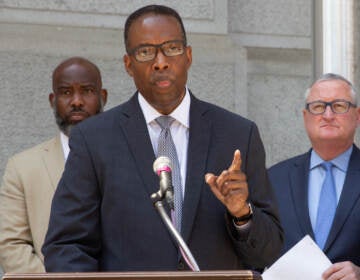Philly Council committee advances two pieces of police reform package
The measures come in the wake of nearly three weeks of protests over police brutality, following the killing of George Floyd in Minneapolis.
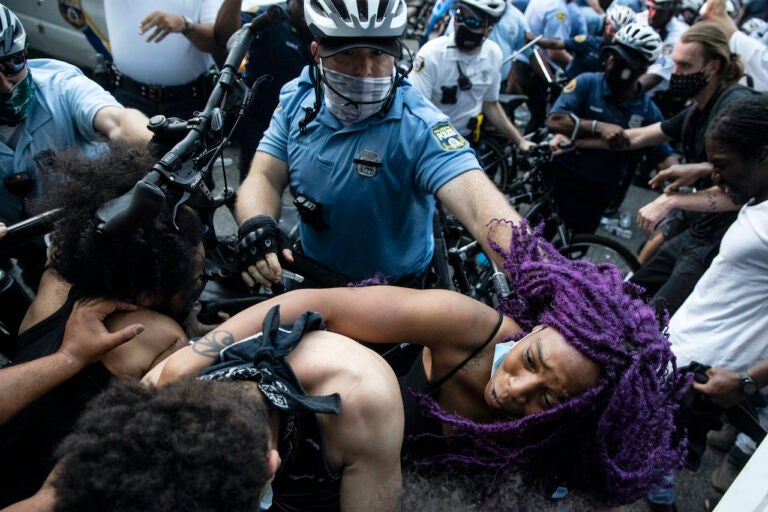
Police and protesters clash Saturday, May 30, 2020, in Philadelphia, during a demonstration over the death of George Floyd, a black man who was in police custody in Minneapolis. (AP Photo/Matt Rourke)
Over objections from the Kenney administration, a City Council committee on Wednesday passed a measure that would require most civil service employees, including newly hired police officers, to live in Philadelphia.
The committee on Wednesday also passed a bill to establish a Citizens Police Oversight Commission. The two measures come in the wake of nearly three weeks of protests over police brutality, following the Memorial Day killing of George Floyd in Minneapolis by an officer.
Both bills will get a first read during City Council’s session on Thursday, and the bill’s sponsors hope to pass them during a vote next week.
“If you want to serve the citizens of Philadelphia, I do not think it’s too much to ask that you live in the City of Philadelphia,” said City Councilmember Cindy Bass, a member of the Committee on Law and Government. “If that is too much, then we should find people who are willing to make that commitment.”
Civil servants currently have to live in the city within six months of being hired. Under the measure, that requirement would be extended to at least a year.
Since 2010, Philadelphia police officers have been allowed to live outside of the city after at least five years on the job. If the measure passes, that option would no longer be available to new recruits.
Most residents who testified during Wednesday’s hearing said that was a good idea.
“They have to feel like they have a stake in the city, ” said Joann Bell, a member of the Black Women’s Leadership Council.
The measure maintains an existing waiver program that enables city departments to hire non-residents if they are otherwise unable to fill a position.
The Kenney administration said it is committed to removing the five-year residency waiver during the next round of contract negotiations with the Fraternal Order of Police. However, the administration raised concerns about requiring civil servants to live in the city for at least a year before they are hired, saying the proposal would make it difficult to recruit diverse and qualified applicants for “harder-to-fill” positions.
“It is likely that we will need to go through a full recruitment and testing cycle before identifying the need for a waiver. This will lead to additional delays in our time to hire and ability to timely fill critical positions in various City departments,” Stepanie Tipton, the city’s chief administration officer, said in written testimony.
Nearly 85% of civil service positions are filled by city residents.
The administration does support an effort to create a Citizens Police Oversight Commission, a permanent and independent agency to oversee the Philadelphia Police Department.
The idea is to create a new, more powerful entity to conduct investigations into allegations of police misconduct made by residents, as well as make policy recommendations.
“We have a chance to do something big — to do something new. And to learn lessons from the past,” City Councilmember Helen Gym said.
The commission would permanently replace the current Police Advisory Commission. Supporters also hope it will have a more predictable budget, similar to the police oversight groups that operate in other major cities, including New York and Chicago, which make funding proportional to the police department’s budget.
Staff members on the current commission, created by an executive order in 1993, are expected to be part of the new agency, according to a source familiar with the legislation.
Hans Menos, the PAC’s executive director, said he supports the bill.
“Though we’ve received a lot of support for our initiatives, many people have expressed that the policy work that we put forward should be an aspect of our work and not its primary focus. The feedback across the board is that PAC should lead investigations into police misconduct,” Menos said.
Both measures passed out of committee by an 8-1 vote. City Councilman Brian O’Neil was the only committee member to vote against both bills.
The measures are expected to pass the full Council before June 25, the last legislative session on the calendar before the body breaks for summer. They were introduced after a veto-proof majority of City Council sent a letter to the Kenney administration stating the signees could not approve a $19 million increase to the Philadelphia Police Department’s budget.
The next day, Kenney abruptly rescinded his proposal to send additional funding to the scandal-plagued department, which has recently come under fire for using tear gas to disperse protesters who blocked traffic on I-676 during a massive demonstration earlier this month, and for apparently allowing two groups of mostly white men with bats and other makeshift weapons to gather in public and to assault some people — one outside the police district in Fishtown and the other guarding the statue of Christopher Columbus in South Philadelphia.
Saying the department faced a “crisis of legitimacy,” the letter, signed by 14 of Council’s 17 members, also laid out 15 policy changes aimed at ensuring “transparency and accountability.”
Some of those changes are now codified in the bills Council is considering.
“We need to carpe diem — seize the moment and make appropriate changes so that citizens of Philadelphia have a degree of confidence that they are respected as taxpayers and treated as citizens of this country with dignity and respect,” City Councilmember Curtis Jones said.
Council is also considering a measure that would expressly prohibit chokeholds and other physical restraints while detaining suspects, including hogtying and the “placement of body weight on the head, face, neck, chest or back.”
Another bill would require a public hearing within 30 days of the city “executing, entering into or amending” its contract with the Fraternal Order of Police, the union that represents city officers.
Under the measure, the hearing would address the cost of the contract, as well as terms and conditions under consideration, among other things. Council, however, would not have the authority to stop any agreements from becoming binding and effective.
Both bills will be discussed during a hearing next Tuesday before Council’s Committee on Public Safety, but neither measure is expected to go before the full Council for a vote until the fall, according to a source familiar with the legislation.

Get daily updates from WHYY News!
WHYY is your source for fact-based, in-depth journalism and information. As a nonprofit organization, we rely on financial support from readers like you. Please give today.



